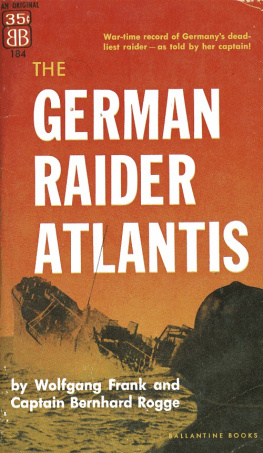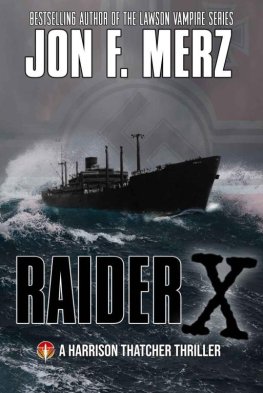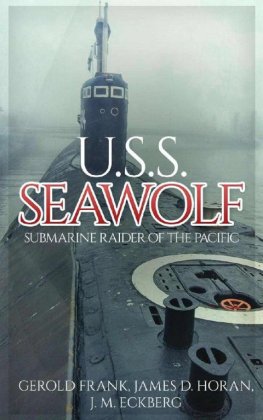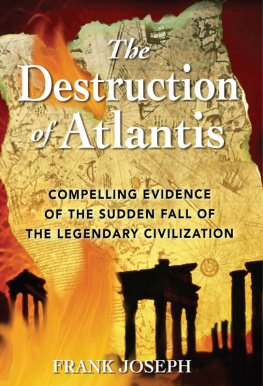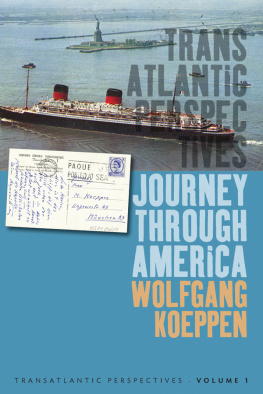Wolfgang Frank - The German Raider Atlantis
Here you can read online Wolfgang Frank - The German Raider Atlantis full text of the book (entire story) in english for free. Download pdf and epub, get meaning, cover and reviews about this ebook. City: New York, year: 1956, publisher: Ballantine Books, genre: Adventure. Description of the work, (preface) as well as reviews are available. Best literature library LitArk.com created for fans of good reading and offers a wide selection of genres:
Romance novel
Science fiction
Adventure
Detective
Science
History
Home and family
Prose
Art
Politics
Computer
Non-fiction
Religion
Business
Children
Humor
Choose a favorite category and find really read worthwhile books. Enjoy immersion in the world of imagination, feel the emotions of the characters or learn something new for yourself, make an fascinating discovery.
- Book:The German Raider Atlantis
- Author:
- Publisher:Ballantine Books
- Genre:
- Year:1956
- City:New York
- Rating:3 / 5
- Favourites:Add to favourites
- Your mark:
- 60
- 1
- 2
- 3
- 4
- 5
The German Raider Atlantis: summary, description and annotation
We offer to read an annotation, description, summary or preface (depends on what the author of the book "The German Raider Atlantis" wrote himself). If you haven't found the necessary information about the book — write in the comments, we will try to find it.
The German Raider Atlantis — read online for free the complete book (whole text) full work
Below is the text of the book, divided by pages. System saving the place of the last page read, allows you to conveniently read the book "The German Raider Atlantis" online for free, without having to search again every time where you left off. Put a bookmark, and you can go to the page where you finished reading at any time.
Font size:
Interval:
Bookmark:

"QQQQshelled by ra..."
"It was 6:43 A.M. when the lookout spotted smoke on the horizon. I cleared for action and we waited, trying to pierce the morning haze. The ship came slowly over the horizon, paying no attention to us. As she cruised unsuspectingly across our hows at 7,500 yards, I ordered the attack.
"We raised the camouflage flaps and fired four warning shots from the 3-inch gun. Our flag signal to heave-to streamed out in the morning breeze. Although the ship acknowledged our signal, she at once began to use her radio. She got as far as 'QQQQshelled hy :ra...' when a direct hit in the radio room put an end to her distress-signal and another shattered the mast.
"Our victim's fate was sealed."
Captain Rogge, commander of the Atlantis-, tells here the fantastic story of his two years' voyage, of ships sunk and prizes taken. On one of those ships was Life photographer David E. Scherman, and a special Epilogue based on British Naval reports tells how one of Scher-man's photographs, published in Life, aided HMS Devonshire in identifying Atlantis and sending the German raider to the bottom.
Other Ballantine Books you will enjoy:
120. U-BOATS AT WAR,
by Harald Busch
German Submarines in action, 1939-1945. From the easy "kills" of the war's first days to the last, desperate patrols, this is the story told by an insiderof German U-boats and the war they almost won.
168. THE ROAD TO STALINGRAD,
by Benno Zieser
When the German Sixth Army surrendered to the Russians at Stalingrad, they lost a campaign of unparalleled horror and hardship. Zieser's first-hand account is intensely moving and honesta personal ordeal with a universal meaning.
183. DEFEAT AT SEA,
by C. D. Bekker
The struggle and eventual destruction of the German Navy in World War II. Includes firsthand accounts of sorties by miniature submarines, the channel escapades of the Scharn-horst and Gneisenau, and details about secret weapons.
THE GERMAN RAIDER ATLANTIS
by Wolfgang Frank and Bernhard Ronge
Translated by Lt.-Cdr. R. O. B. Long, RNVR
BALLANTINE BOOKS NEW YORK
, 1956, by Ballantine Books, Inc.
Library of Congress Catalog Card No. 56-12819 Printed in the United States of America
BALLANTINE BOOKS, INC.
101 Fifth Avenue New York 3, N. Y.
CONTENTS
PART ONETHE ATLANTIC
July 1939May 1940
1. Fitting Out
2. North About
3. A New Disguise
4. The Baptism of Fire
5. Minelaying Mission
PART TWO----THE INDIAN OCEAN
MayDecember 1940
6. Under Dutch Colours
7. The 'City of Baghdad'
8. The 'Kemmendine's' Gunner
9. A Family Concern
10. Five Months at Sea
11. The 'Benarty's' Mails
12. The Loss of the 'Tirranna'
13. The Epic of the 'Durmitor'
14. Tankers and Top Secrets
PART THREEROUND THE WORLD
JanuaryNovember 1941
15. The Kerguelen Islands
16. New Tactics
17. A Meeting with the 'Scheer'
18. The 'Zam Zam's' Passengers
19. A Narrow Escape
20. Coral Strands
PART FOURHOMEWARD BOUND
November 22nd, 1941New Year's Day, 1942
21. Enemy Warship in Sight!
22. 'Home Is the Sailor...'
Appendix: The Other Side of the Story
The Atlantic
July 1939-May 1940
AT the end of July, 1939, I took the sailing-training-ship Albert Leo Schlageter with a crew of petty officer cadets on a cruise into the Baltic. It was less than a month since I had come back from a routine cruise to South America, and on returning to Germany I had immediately noticed the tension in the air. People were overwrought by the rumours of war that were everywhere to be heard yet we all felt that a real war would be criminal madness and for this reason alone we were convinced that it could never happen.
Nevertheless before sailing I took the precaution of making some inquiries about my assignment to a command in the unhappy event of hostilities breaking out. The official at the Officers' Appointments Branch looked down his mobilization list and then winked as he said with obvious envy, '// anything happens, you've got a plum job. There, read it for yourself!' On the index card was this entry, 'Rogge, Bern-hard, Commander. War appointment: SHK II, in command'.
The letters SHK stand for Heavy Armed Merchant Cruiser,' said the official. 'It's the finest job going. Wolf, Mwe, Seeadlercommerce-raiding, coral beaches and palm-treesyou know the form.'
The three ships he had mentioned were famous commerce-raiders in the First World War. I thanked him warmly and sailed off cheerfully enough with my young crew into the Baltic; yet I grew daily more certain that the parting of the ways was nearnot only from my beloved sailing ship with her well-scrubbed teak decks, her lofty masts and smartly-trimmed yards, but from an untroubled and pleasant existence.
I was not really surprised, therefore, to receive an order to break off the cruise and return immediately to Kiel, 'because enemy submarines had been sighted in the Baltic'; the date was 25th August, 1939. The tension was acute as we speculated on the chances of reaching a peaceful settlement with Poland, but on 1st September the sound of bugles rang out from our wireless loudspeaker followed by the unmistakable voice of the Fhrer announcing that 'as from 6 a.m. we shall return the enemy's fire'. England declared war on us two days later and what had been a local punitive police action broadened into a new world conflict.
I immediately got in touch by telephone with the naval authorities at Bremen who were responsible for converting and fitting out the auxiliary cruiser. I received a rather surprising reply to the effect that nothing was known either about my ship or myself and I decided to go to Bremen and find out what had happened. The misunderstanding was soon cleared up and I located the ship and made arrangements to move her into the dockyard. I took care to wear plain clothes, as secrecy was paramount.
Next I visited the newly-opened Naval Drafting Office at Bremen, where I was shown a pile of name-cards which were intended for issue as personal identity-cards to the crew of 'Heavy Auxiliary Cruiser II'as was written hi bold letters on each cardyet nobody was supposed to know that such a thing as an armed merchant cruiser even existed! For security reasons the men who held these passes were moved to the barracks of the Petty Officers' Training School at Bremer-haven, where we gradually assembled a carefully-selected crew under the non-committal designation of 'Ship 16'. I took up my quarters at the Hotel Columbus in Bremen and here I was joined by the twenty-odd officers who were to serve under me. The sooner they got to know me and each other, the better; only by making close personal contact with them could I hope to detect and eliminate any undesirable elements before we sailed.
The officers allotted to me were endowed with a variety of talents. Some were regular career officers like my First Lieutenant, Khn and my Gunnery Officer, Lieutenant Kasch; others, equally competent, came from the Merchant Navy, like the Navigation Officer, Captain Kamenz. There were also a number of officers from the Merchant Navy, all with mate's or master's certificates, who had been accorded the rank of Sub-Lieutenant (S) in the Navy; they would eventually take command of the prizes we hoped to capture. The (S) stood for 'Special Service'. I took a great deal of trouble to seek out the right men for these duties, for energy and courage of a high order would be required to sail a prize-ship home through enemy-occupied waters with only a handful of men as crew, and perhaps the additional problem of rebellious prisoners.
Next pageFont size:
Interval:
Bookmark:
Similar books «The German Raider Atlantis»
Look at similar books to The German Raider Atlantis. We have selected literature similar in name and meaning in the hope of providing readers with more options to find new, interesting, not yet read works.
Discussion, reviews of the book The German Raider Atlantis and just readers' own opinions. Leave your comments, write what you think about the work, its meaning or the main characters. Specify what exactly you liked and what you didn't like, and why you think so.

